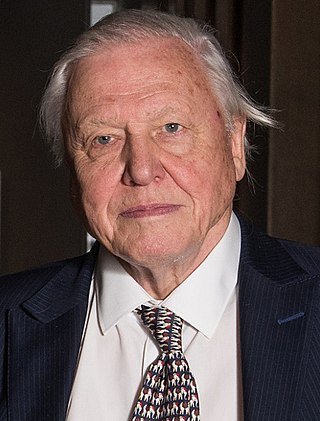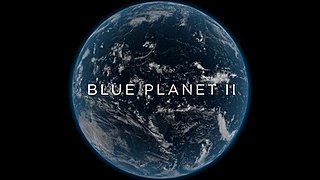Related Research Articles

Sir David Frederick Attenborough is an English broadcaster, biologist, natural historian and author. He is best known for writing and presenting, in conjunction with the BBC Natural History Unit, the nine natural history documentary series forming the Life collection, a comprehensive survey of animal and plant life on Earth.

The Blue Planet is a British nature documentary series created and produced by the BBC. It premiered on 12 September 2001 in the United Kingdom. It is narrated by David Attenborough.
Andy Byatt is an English wildlife documentary film producer for the BBC Natural History Unit (NHU) in Bristol. His expertise is in the creation of underwater wildlife films. He co-directed Deep Blue, a natural history feature film about the oceans narrated by Michael Gambon. This film was largely put together with highlights from the NHU's internationally acclaimed series, The Blue Planet, of which Byatt was one of the producers, along with Alastair Fothergill and Martha Holmes. His most recent project is Planet Earth an 11-part High-definition TV wildlife series first aired in March 2006.

George Richard Ian Howe, known professionally as George Fenton, is an English composer. Best known for his work writing film scores and music for television, he has received five Academy Award nominations, several Ivor Novello, BAFTA, Golden Globe, Emmy and BMI Awards, and a Classic BRIT. He is one of 18 songwriters and composers to have been made a Fellow of the Ivors Academy.

Simon Henry King OBE HonFRPS is a British naturalist, author, conservationist, television presenter and cameraman, specialising in nature documentaries. King received an Honorary Fellowship of the Royal Photographic Society in 2011.

A nature documentary or wildlife documentary is a genre of documentary film or series about animals, plants, or other non-human living creatures, usually concentrating on video taken in their natural habitat but also often including footage of trained and captive animals. Sometimes they are about wildlife or ecosystems in relationship to human beings. Such programmes are most frequently made for television, particularly for public broadcasting channels, but some are also made for the cinema medium. The proliferation of this genre occurred almost simultaneously alongside the production of similar television series.

Nigel Alan Marven is a British wildlife TV presenter, naturalist, conservationist, author, and television producer. He is best known as presenter of the BBC miniseries Chased by Dinosaurs, its sequel, Sea Monsters, as well as the ITV miniseries Prehistoric Park. He is also known for his unorthodox, spontaneous, and daring style of presenting wildlife documentaries as well as for including factual knowledge in the proceedings.

Stephen James Backshall is a British naturalist, explorer, presenter and writer, best known for BBC TV's Deadly 60.

Alastair David William Fothergill is a British producer of nature documentaries for television and cinema. He is the series producer of the series The Blue Planet (2001), Planet Earth (2006) and the co-director of the associated feature films Deep Blue and Earth.

Wild Africa is a British nature documentary series created and produced by the BBC. It explores the natural history of the African continent. It was first transmitted on 7 November 2001 on BBC Two in the United Kingdom and comprises six episodes. Each concentrates on a particular environment. The producers use aerial photography and wildlife footage to show how natural phenomena such as seasonal changes influence the patterns of life. Wild Africa was produced by the BBC Natural History Unit and narrated by Fergal Keane.

Galápagos is a three-part BBC nature documentary series exploring the natural history of the Galápagos Islands and their important role in the formation of Charles Darwin's theory of evolution. It was first transmitted in the UK on BBC Two in September 2006.

Earth is a 2007 nature wildlife documentary film which depicts the diversity of wild habitats and creatures across the planet. The film begins in the Arctic in January of one year and moves southward, concluding in Antarctica in the December of the same year. Along the way, it features the journeys made by three particular species—the polar bear, African bush elephant and humpback whale—to highlight the threats to their survival in the face of rapid environmental change. A companion piece and a sequel to the 2006 BBC/Discovery television series Planet Earth, the film uses many of the same sequences, though most are edited differently, and features previously unseen footage not seen on TV.

The BBC Wildlife Specials are a series of nature documentary programmes commissioned by BBC Television. The series premiered in 1995, and 22 specials have been produced to date, with most of the more recent ones consisting of multiple episodes. The earlier programmes were produced in-house by the BBC's Natural History Unit, but the more recent Spy in the ... titles were made by the independent John Downer Productions. The first 18 specials, through 2008, were narrated by David Attenborough. Polar Bear: Spy on the Ice (2010), Penguins: Spy in the Huddle (2013) and Dolphins: Spy in the Pod (2014) were narrated by David Tennant.

Frozen Planet is a 2011 British nature documentary series, co-produced by the BBC and The Open University. It was filmed by the BBC Natural History Unit. The production team, which includes executive producer Alastair Fothergill and series producer Vanessa Berlowitz, were previously responsible for the award-winning series The Blue Planet (2001) and Planet Earth (2006), and Frozen Planet is billed as a sequel of sorts. David Attenborough returns as narrator. It is distributed under licence by the BBC in other countries, Discovery Channel for North America, ZDF for Germany, Antena 3 for Spain and Skai TV for Greece.

James Honeyborne is the creative director of Freeborne Media, he previously worked as an executive producer at the BBC Natural History Unit where he oversaw some 35 films, working with multiple co-producers around the world. His projects include the Emmy Award and BAFTA-winning series Blue Planet II, the Emmy Award-nominated series Wild New Zealand with National Geographic, and the BAFTA-winning BBC1 series Big Blue Live with PBS.

Life is a British nature documentary series created and produced by the BBC in association with The Open University. It was first broadcast as part of the BBC's Darwin Season on BBC One and BBC HD from October to December 2009. The series takes a global view of the specialised strategies and extreme behaviour that living things have developed in order to survive; what Charles Darwin termed "the struggle for existence". Four years in the making, the series was shot entirely in high definition.

Mike Gunton is a British television producer and a senior executive at the BBC Natural History Unit, the world's largest production unit dedicated to wildlife film-making. In November 2009 he became the Unit's first Creative Director.
Keith Scholey is a British producer of nature documentaries for television and cinema, and a former television executive. He is the joint series producer of the Netflix original documentary series Our Planet, the joint director and executive producer of David Attenborough: A Life on Our Planet, and executive producer of Breaking Boundaries: The Science of Our Planet. He is the executive producer of the 2021 BBC / Discovery series A Perfect Planet, The Mating Game and The Earthshot Prize: Repairing Our Planet. He also co-directed African Cats, Bears, and Dolphin Reef with Alastair Fothergill for Disneynature, and is also the executive producer of the series North America for the Discovery Channel.

Douglas Allan is a Scottish wildlife cameraman and photographer best known for his work in polar regions and underwater.

Blue Planet II is a 2017 British nature documentary series on marine life produced by the BBC Natural History Unit. Like its predecessor, The Blue Planet (2001), it is narrated and presented by naturalist Sir David Attenborough.
References
- ↑ "Medals and Awards" (PDF). Royal Geographical Society. Archived from the original (PDF) on 2 October 2013. Retrieved 28 September 2013.
- ↑ "Shoppers urged to shun endangered fish". BBC News. 19 February 2002. Retrieved 19 July 2008.